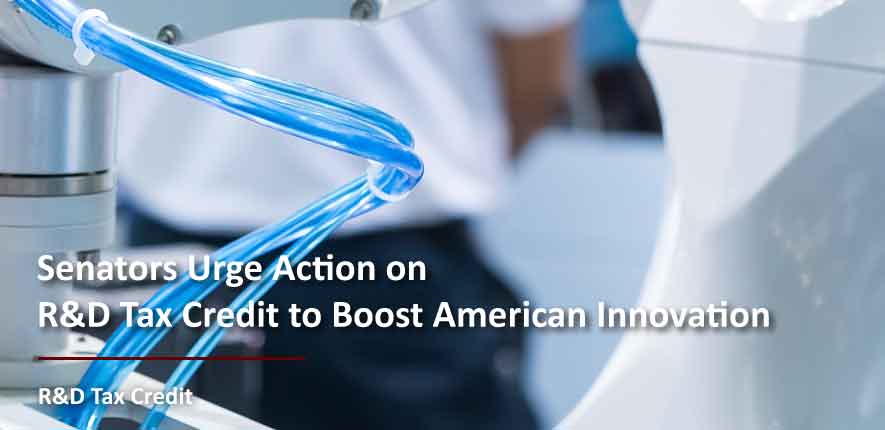
Mar 26, 2024 Senators Urge Action on R&D Tax Credit to Boost American Innovation
Current status of the R&D tax credit
Many small businesses rely upon the R&D tax credit to help fund their innovation goals. The five-year amortization requirement introduced by the Tax Cuts and Jobs Act of 2017 (TCJA), which took effect in 2022, has had a negative impact on many businesses within the United States. The requirement reduced the effectiveness of the R&D credit, thus stifling innovation. The amortization requirement is one of a string of challenging modifications to the R&D tax credit, which includes the recent additional documentation requirements for amended R&D credit claims as well as proposed changes to form 6765. The changes are burdensome to American business and are contrary to the original intent of the credit to stimulate economic growth and foster innovation.
H.R. 7024 “The Tax Relief for American Families and Workers Act of 2024”
While many bills have been put forward in both the House and the Senate, the most promising has been the Tax Relief for American Families and Workers Act of 2024 (H.R. 7024), which was passed by the House of Representatives on January 31, 2024 with a vote of 357 to 70. This bipartisan bill, sponsored by Senator Ron Wyden and Representative Jason Smith, would extend the immediate deduction of R&D expenditures through 2026. It would also expand the child tax credit, extend 100% bonus depreciation, increase the supply of affordable housing, and crack down on fraudulent claims of the Employee Retention Credit. After its passing in the House, there has been little movement or news from the Senate over the past seven weeks.
Updates from Senate Finance Hearing
- Many senators on the committee spoke in support of the bill during their statements.
- Sen. Wyden stated a willingness to remove the child tax credit lookback from the tax bill in an effort to push the bill through.
- Senators criticize several policies proposed in the budget as disincentivizing American innovation and hurting American manufacturing.
On Thursday, March 21, the Senate Finance Committee held a hearing on the Biden 2025 Budget Proposal, questioning Treasury Secretary Janet Yellen on various aspects of the proposed budget, with many members noting concern about the proposed increase of the corporate tax rate and aspects of the budget that would have a negative impact on various American manufacturing industries. After weeks of silence from the Senate, many members of the committee stated their desire to see the tax bill (H.R. 7024) passed while urging Yellen and the administration for more aggressive incentivization of R&D in the US, which falls short in incentivizing R&D when compared to countries, specifically China.
“When a Chinese company invests $1 million in R&D, the Chinese government gives them an immediate $2 million tax deduction. By contrast, when an American Business invests $1 million in R&D, our tax code provides an immediate $100,000 tax deduction” – Sen. Hassan
“the Biden proposal proposes increasing the corporate tax rate to 28%, which according to the US tax Foundation, would result in the United States having the second highest combined rate among developed countries” – Sen. Crapo
While voicing support proposed tax bill, several also highlighted the proposed hike in corporate tax as harmful to American innovation and making more urgent the need to reinstate immediate deduction of R&D expenses. The proposed increase of the corporate tax rate from 21% to 28% compounds the effect of the amortization requirement and would have an even greater impact on American manufacturing in 2025 if congress is unable to find common ground in passing H.R. 7024.
Yellen spoke of various areas where the Biden proposal seeks to incentivize R&D in specific industries, such as semiconductor manufacturing and clean energy, but agreed that it was important for the deduction of R&D expenditures to be reinstated.
The prospects for passing the R&D tax credit legislation are mixed, as the Senate has not yet taken up the House-passed bill or any other similar bill. Several senators from both parties voiced their support for the R&D tax credit and highlighted its importance for American innovation, competitiveness, and job creation. Senator Wyden, on multiple occasions, voiced a willingness to remove the Child Tax Credit lookback policy from the tax bill in order to push it through and get the R&D expense amortization pushed back.
ICS Tax, LLC (ICS) is a consulting firm providing innovative tax planning strategies. ICS collaborates with taxpayers and their tax professionals to identify credits and incentives that reduce tax liabilities and increase profitability. ICS provides nationwide service through its offices located throughout the country. Contact us to learn more about the R&D Tax Credit and how this new Act applies.
Authors:
Tyler Bonts, R&D Manager
Alex Bagne, JD, CPA, MBA, CCSP, President


